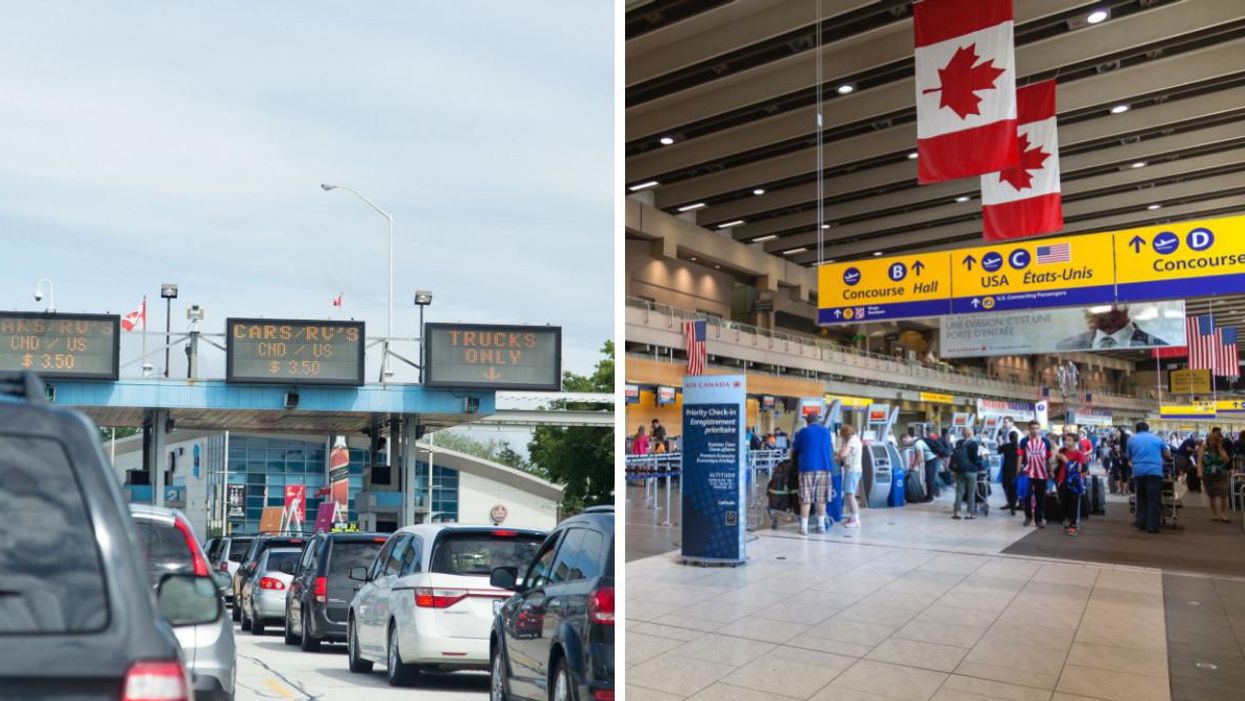CBSA Revealed How Travellers Crossing The Border This Summer Can Help Reduce Long Wait Times
There are tips for travellers who are crossing the land border or coming to Canada by plane. 🚗✈️

Cars lined up at a Canada-U.S. border crossing. Right: Travellers at the Calgary International Airport.
Canada Border Services Agency (CBSA) has revealed how travellers crossing land and air borders this summer can help reduce long wait times at airports and the Canada-U.S. border.
In a notice posted on May 18, CBSA told all travellers crossing the border what to expect during the "busy" summer months, whether they're returning home to Canada or visiting.
"This summer, travellers are returning to a border that is managed differently, with evolving COVID-19 requirements, which can mean delays during peak periods," the government agency said.
Even though border officers are working to reduce long border wait times, there are things travellers can do to make the process easier and faster for not only themselves but for other travellers too.
Check if you're allowed to enter Canada
Before you travel, it's important to make sure that you're eligible to enter Canada. Foreign nationals must meet certain entry requirements and provide appropriate travel and immigration documentation.
The final determination on entry is made by a border services officer at the port of entry whether it be land, air or water.
Know Canada's travel restrictions
Canada's travel restrictions are evolving and there are different rules for different people (foreign nationals, returning residents, Canadian citizens) so you need to understand the COVID-19 travel rules.
There are still border measures in place for COVID-19 which include testing, proof of vaccination and quarantine for some travellers.
Use the ArriveCAN app or website
All travellers regardless of their vaccination status are required to submit their information in the ArriveCAN app or website up to 72 hours before entering Canada.
"ArriveCAN collects contact, health and travel information to protect the health and safety of travellers and expedite processing at the border," CBSA said. "It is the fastest, easiest and most secure way for travellers to show they meet public health requirements."
First, you need to make sure you have the most up-to-date version of the app.
Once you've submitted the necessary information, you should print or take a screenshot of your ArriveCAN receipt and bring it with you when you travel.
Check land border wait times
If you're travelling across the Canada-U.S. border, CBSA recommends planning ahead and checking border wait times online for both the Canadian and American sides.
By checking when wait times are longer, you can plan on crossing over during non-peak hours, which include the early morning.
Have your documents ready
Having all of your documents ready to be presented to officials at the land border can save time as well.
You should have your ArriveCAN receipt, passport or travel documents, proof of vaccination and identification for every person in the vehicle ready and easily accessible before you speak with a border officer.
Be ready to declare your purchases
Travellers returning to Canada must declare all goods purchased and/or received while outside the country.
CBSA recommends having your receipts for purchases made outside of Canada ready to show border officers.
Not only do you have to declare purchases but you also have to declare any foods, plants or animals (including animal by-products) to border officers.
Any money or current that's CA$10,000 or more must be declared as well.
Know the exemption limits
If you're returning to Canada with purchases from across the border, there are exemption limits that you should know about before spending money.
You can bring back tax and duty-free goods valued at CA$200 after being away for 24 hours and goods valued at CA$800 after 48 hours.
There are no exemptions for same-day cross-border shopping trips so you need to be prepared to pay tax on those purchases and possibly duty as well.
CBSA has a duty and taxes estimator to calculate taxes on goods purchased in the U.S.
Try advance declaration
If you're travelling to Canada by air and landing at the Toronto (YYZ) or Vancouver (YVR) airports, you can do an advance declaration to save time.
You can use the web version of ArriveCAN to complete your customs and immigration declaration before your arrival.
Know what's in your vehicle
CBSA also recommends knowing everything that is in your vehicle when crossing the land border.
All travellers can consult the government's website for information on restricted and prohibited goods, including firearms and cannabis.
Not only have there been delays at border crossings including long lines at airports in Canada, but there have also been delays with Canadian passport applications and renewals.
The federal government has recently taken "additional steps" so that Canadians can get their passports faster.
Before you get going, check out our Responsible Travel Guide so you can be informed, be safe, be smart, and most of all, be respectful on your adventure.
- The Feds Are Taking 'Additional Steps' So Canadians Can Get Their ... ›
- 7 Things You Need To Know Before Going To The Airport If You ... ›
- Here's What Happens If You Forget To Use ArriveCAN When ... ›
- There's A Backlog Of Nearly 300K Nexus Applicants Right Now & Here's Why It's So Chaotic - Narcity ›
- Alberta's US border crossing is changing and here's how it will affect your travels - Narcity ›